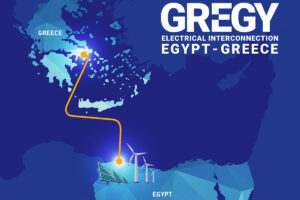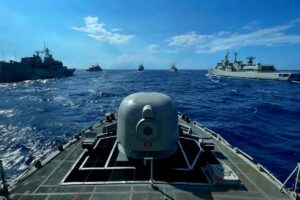The signs that a full-scale Greek-Turkish negotiation is being launched – with the blessing and behind-the-scenes mediation of the Americans – are too many to ignore. In an article a few days ago, I referred in detail to the issue of the demilitarization of the eastern Aegean islands and how the “Aegean Prespes” will be served, highlighting the wider diplomatic machinations of the Turks, Americans and Germans.
To delude the Greek people they will offer an “attractive” package with two parts: First, the signing of a Non-Aggression Pact and second, referral to The Hague. Both will be presented as the end of the 50-year Greek-Turkish conflict. They will bombard us with claims that Greece will be free of the Cold War with Turkey, which is draining resources, causing insecurity and diverting development initiatives and this is how the “Aegean Prespes” will be served.
Who wouldn’t want our relations with Ankara to radically change? But is this how they will be presented to us with the undivided assistance of the mainstream media? To answer this question, we need to look at the price we will have to pay to enable both the signing of such a pact and its referral to The Hague. And the price, of course, no one is talking about. Not only now, when we are still in the election period, but also in the post-election period, when – by the agreed programming – bilateral negotiations will be launched.
The negotiation will be comprehensive, but it will be modular. This means that all issues will be put on the table and an attempt will be made to find arrangements for all of them, but it is not necessarily a package. They will try, but they will have the flexibility to create “problem-solving” dynamics with individual agreements. Chavusoglu’s earlier statement is indicative: “It is useful to discuss these as a package, not to pick and choose one issue.” Referring to demilitarisation he added: “We will continue to keep it in the news of the international community. One of the purposes of the talks is to resolve this issue.”
The ‘Carrot’ of the The Hague
All the “diplomatic materials” that will be mobilised from the summer are old, in the sense that they have been used in the past, but without success. This applies to the Non-Aggression Pact and formulas for “multi-band territorial waters” and “partial demilitarization”. Ankara has not taken a step back from its long-standing position as far as the International Court of Justice is concerned.
It maintains that a bilateral all-inclusive negotiation must first take place, i.e. a negotiation on all of Turkey’s unilateral expansionist claims. If this does not bear fruit, the ‘disputes’ could and conditionally be referred to the Hague. They are even making sure to send the message that everything will be referred to the Hague, not only the delimitation of the continental shelf – EEZ.
In reality, they are offering the ‘cheese’ as a referral to The Hague to drag Athens to the bilateral negotiating table, and all indications are that they have succeeded. A referral to the International Court of Justice requires a co-signature because Turkey has not recognised its jurisdiction, as Greece has done, except for sovereignty and defence issues. As the occasional Greek-Turkish talks have shown, the obstacle has been and remains the conditions that Ankara has set and continues to set for signing a co-contract:
First, Turkey demands that not only the legal dispute over the delimitation of the continental shelf-EEZ be referred to The Hague, but the whole of Turkey’s unilateral expansionist claims. It even uses the term ‘incidental issues’, meaning demilitarisation and ‘grey zones’. In other words, he asks that we put to the judgment of foreign judges firstly whether the Greek islands will be turned into hostages of Turkey and secondly, whether rocky islets and inhabited islands (Oenoussa, Fourni, Agathonisi and many others) will remain in Greek territory or will be handed over to Turkey, which claims that they are its own!
Secondly, Turkey requires the co-contract to indicate to the International Court of Justice how to delimit the EEZ-continental shelf. In fact – as the minutes of the exploratory contacts under Simitis show – the two sides were negotiating not only the method but also the map of delimitation to ask the International Court of Justice to simply put its stamp of approval. Note that the Court has no problem if the two sides agree. As is also clear from the same transcripts, Ankara is asking Athens to co-sign a co-signature, essentially accepting that the rights, which international law grants to Greece, will be circumvented!
The reference to “delimitation of maritime zones”
Athens firmly recognizes the delimitation of the continental shelf – EEZ as the only Greek-Turkish dispute, because it is the only one not covered by the provisions of international law or existing treaties. This does not mean that it denies the existence of the other problems in the Aegean. However, it considers that these are problems of a political nature, in the sense that they have arisen from unilateral Turkish expansionist claims. That is why for decades the official Greek position has been that only the issue of the continental shelf – EEZ – should be referred to the International Court of Justice.
Mitsotakis, however, talks about “delimitation of maritime zones”. As you will see below, this is not an innocent slip of the tongue. In addition to the continental shelf-EEZ, maritime zones also include territorial waters. Recall that the extension of territorial waters to 12 miles is – under international law – a right exercised unilaterally by each coastal state. However, Greece, succumbing to the Turkish casus belli, had accepted under Simitis – as is clear from the minutes – its unilateral right to be turned into a subject of bilateral negotiations. It was negotiating territorial waters of varying extent from region to region.
The formula is now back on the table. The Turks are reportedly willing to allow(!) us to extend our territorial waters to 12 miles in the south of Crete and the western Aegean, but not in the east north and south. There they will remain at six miles, or in the areas remote from the Asia Minor coast they might be extended to 7-8 miles. Also, “free passage” channels will be established for Turkish ships through Greek territorial waters as well. If this is not an accommodation to Ankara’s positions, what is it?
The phobic syndrome as a weapon
A precondition for all this, however, is that Greece accepts the signing of a Turkish-style pact, as I described above. The International Court of Justice is a judicial body, but it has been shown that its decisions are also influenced by political criteria. Especially if the pact leaves room for manoeuvre, as Ankara is seeking.
The problem for Greece is that only Greek sovereign rights will be put before the Court. No Turkish ones. This means that even if the decision is 99% in our favour, Greece will lose and Turkey will win. And yet, there are “experts” in Athens today who light-heartedly (?) suggest – or imply by omission – that we should refer all or almost all unilateral Turkish claims to The Hague.
Although Ankara has avoided blatant aggressive moves after the earthquakes, it has been careful to restate its unilateral expansionist claims. The reason for doing so is that it wants to make it clear that it is not taking a single step backwards. Ankara is not hiding its ambitions. That is why it has made it a condition that the extent of Greek territorial waters, demilitarisation and the ‘grey zones’ be included in the agenda and be the subject of bilateral negotiations.
Essentially, the Turks are seeking to amputate Greece at the negotiating table, using Athens’ phobic syndrome as a weapon. Let us not forget that Erdogan has publicly and repeatedly called for the revision of the Lausanne Treaty. History teaches, but the Greek political system must also want to learn.












